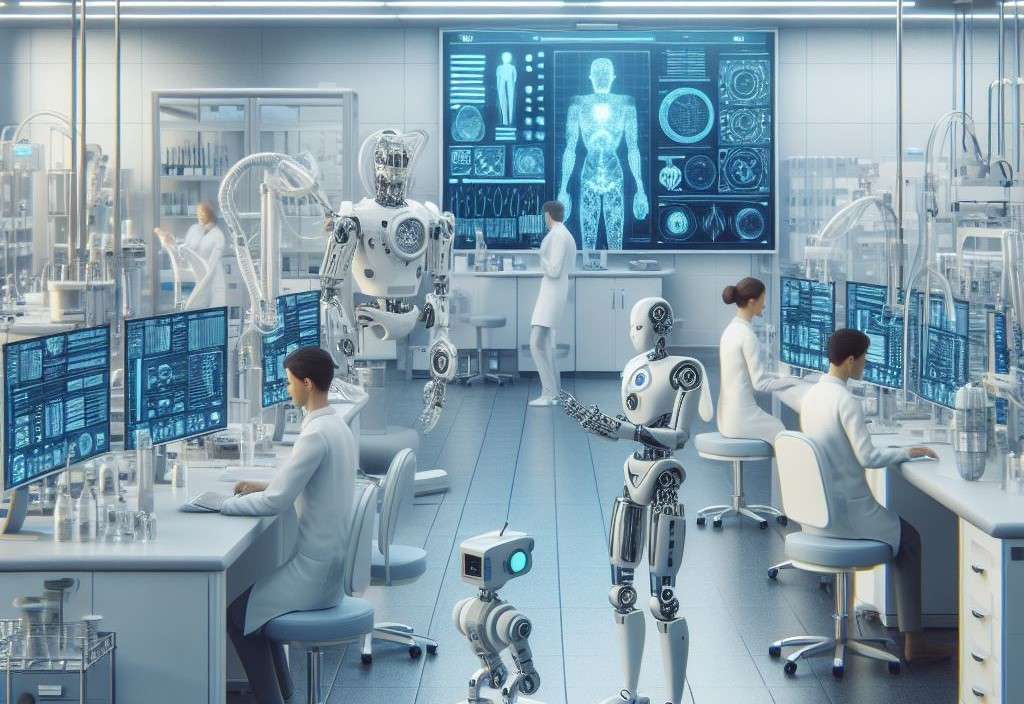How AI is Transforming Laboratory Information Systems (LIS)

Laboratories are the powerhouses of modern medicine, providing vital diagnostic services that guide treatment decisions. Yet changing protocols, ballooning workloads, and increasingly complex tests threaten to overwhelm these critical facilities. Enter artificial intelligence – heralding a new age of enhanced efficiency, precision, and personalization for laboratory information systems.
Streamlining Workflows While Enhancing Accuracy
AI empowers laboratories to ascend past mundane administrative tasks and dated manual processes. Machine learning algorithms pore through oceans of data to spot hard-to-detect patterns and anomalies in test results. This supercharges the analytical capabilities of technicians, allowing more accurate diagnoses in less time. Studies have revealed laboratories leveraging these AI-enabled systems report expanded caseloads, quicker turnaround, and reduced operating expenses.
One solution at the forefront of this transformation is software like NovoPath – a pioneering laboratory information platform combining over 25 years of innovations. Through automation, NovoPath relieves technicians of routine paperwork, freeing them to focus on higher-value work. Meanwhile, its algorithms rapidly comb through complex cases, enhancing precision. Facilities utilizing NovoPath have observed notable improvements across key performance indicators – from increased output to heightened diagnostic accuracy.
Triaging Cases Through Predictive Prioritization
Artificial Intelligence also arms laboratories with predictive analytics to strategically align their resources. By assessing historical trends and real-time patient data, the system can forecast case urgency and complexity. AI Powered software like NovoPath then suggests intelligent workflows – routing the most critical cases to top technicians while efficiently apportioning the rest. This proactive assignment ensures patients receive timely care, with facilitated test prioritization sharply lowering turnaround times.
Paving the Path to Personalization
Personalized medicine aims to deliver treatments uniquely tailored to patients’ genetic makeup. By unlocking genomic datasets and cross-referencing biological factors, AI technology can reveal how individuals may respond to various therapies. These insights allow physicians to pinpoint targeted treatment regimens while avoiding medications likely to trigger adverse reactions. Such custom-fit care demonstrably improves outcomes for numerous conditions.
Continuous Evolution through Machine Learning

A key advantage of AI-powered systems is their ability to perpetually learn from new data. Laboratory Information systems are harnessing machine learning to consistently fine-tune the lab performance. As laboratory techniques and healthcare standards advance, technology adapts in lockstep – ensuring laboratories stay at the frontier of innovation. This fluidity also future-proofs the platform, allowing facilities to continuously operate at peak efficiency.
The infusion of AI signals a new chapter in laboratory information systems – one defined by heightened efficiency, accuracy, and personalization. Underpinning it all is NovoPath – powering laboratories to deliver faster, more tailored care through streamlined workflows, enhanced diagnostics, and perpetual self-improvement. Patients stand to benefit enormously from these optimizations. For in medicine, information and innovation drive outcomes.
Frequently Asked Questions (FAQs)
1. Can AI improve diagnostic accuracy in Laboratory Information Systems (LIS)?
AI improves precision in LIS by employing sophisticated algorithms that act on very complex data sets. These algorithms normally detect subtle patterns, outliers, and trends in laboratory reports which may be more accurate than human beings. The use of AI ensures the achievement of more accurate and reliable diagnostic results, with the result being improved execution of patient care delivery as well as adequate treatment.
2. What role does AI Play in Transforming Laboratory Information Systems?
AI-enabled Laboratory Information Management systems with prediction analytics enable anticipating potential health issues even before the clinical symptoms show up. AI predicts health risks and the likelihood of specific diseases based on past patient records, genetic information as well as other lifestyle factors. This proactive way leads to early interventions, and personalized preventive measures which can accordingly aid in enhancing patient outcomes as well as reducing the costs of healthcare.
3. What is the connection between AI-powered LIS and personalized medicine and treatment plans?
AI-driven Laboratory Information Systems(LIS) contributes to personalized medicine as it can process various types of datasets, such as genetic information. This system can identify individually tailored treatment plans for different patient profiles also considering genetic markers, drug interactions, and the efficacy of a given type of therapy. In general, this drive for precise medicine means that the treatments delivered to patients correspond perfectly with their gene makeup to deliver maximum effectiveness while keeping side effects minimal.
4. How does Artificial intelligence uphold research center experts through real-time direction?
AI in Laboratory Information Systems (LIS) gives real-time decision support by concentrating on time-sensitive cases, proposing follow-up tests based on the evolution of a patient’s condition, and clarifying complex medical situations. Real-time support provides a real-time assurance that laboratory technicians will make accurate and prompt decisions using the most current medical knowledge; this in turn enhances the efficiency and quality of diagnostic processes.
6. Does AI improve laboratory workflows in the future of Laboratory Information Systems LIS?
As AI continues to learn and change, it improves laboratory workflows by continually progressing in unison with advancing healthcare standards protocols, and technologies. Future LIS platforms would be efficient, shorten turnaround periods, and adapt to the workspace’s idea that health industry needs are always changing. The adaptability means that labs are always on the cutting edge of innovation, which in turn improves their overall efficiency.
7. What ethical aspects and privacy protection measures have been integrated with AI-based Laboratory Information Systems?
As LIS moves towards AI, ethics and patient privacy are taken into account. Future LIS platforms will have strong security configurations and ethical policies in place to promote responsible use of patient information. It is vital to strike a balance between innovation, ethics, and trust in AI-driven healthcare solutions. AI-driven learning and information systems must meet certain ethical standards concerning privacy legislation and the transparency of how the data is being used.
Conclusion
Laboratory information systems advancements fulfilled through artificial intelligence shown in solutions like NovoPath signify the enduring commitment to innovation within healthcare. The use of AI in LIS optimizes the current processes as well, pushing laboratories into a new era of accuracy and efficiency. With this technological revolution, the ultimate beneficiaries will be patients whose diagnoses will occur much faster and more accurately thus improving their healthcare service delivery.




